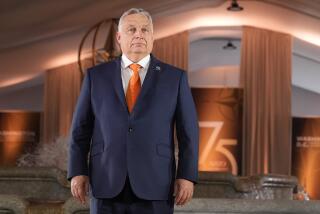Albright Sets Off on 9-Nation Trip
- Share via
ROME — Under the glare of intense media attention, Madeleine Albright arrived here early today on the initial leg of her first overseas trip as secretary of State--an 11-day, nine-nation jaunt that will take her both around the world and deep into America’s toughest foreign policy challenges.
In Europe, Albright plans to meet with government leaders here in Rome as well as in Bonn, Paris, Brussels, London and Moscow. The Russian talks are likely to be dominated by the looming issue of NATO enlargement and unsettling signs that it may have to proceed without Moscow’s cooperation.
From Moscow, she will go to Asia, with stops in Seoul, Tokyo and Beijing. In China, she will be watched closely as her well-known sympathies for human rights causes and pledges to “tell it like it is” collide with the enormous stakes that now ride on the Sino-U.S. political and economic relationships.
In an era in which foreign affairs has consistently been pushed to the fringes of the U.S. political debate, no trip by a secretary of State in recent memory has attracted greater media interest. More than 40 news organizations fought for the 12 press seats aboard her aging Air Force 707 aircraft--seats that in the past have gone begging.
Albright’s position as the first female secretary of State, her fresh, no-nonsense optimism and her ability to discuss complex issues in simple language have contributed to the unusual attention. These factors, together with the tale of her personal odyssey from preteen Czech refugee to high-level U.S. official and new revelations about her family’s past, have heightened public curiosity to such a level that all five major U.S. television networks are along.
The main focus of the Asian leg will be China, where pressures have already mounted for Albright to nudge the Beijing leadership on the delicate human rights issue.
“There’s got to be more than lip service to human rights,” Hong Kong lawmaker Emily Lau said of Albright’s talks with the Chinese leadership in Beijing. “Trade and human rights can coexist. They [the Beijing leadership] have got to be reminded of this.”
Asia is relatively unfamiliar ground for Albright, whose personal and professional life give her a great depth of understanding on European issues. That she has included Asia at all on her initial itinerary underscores the new importance the region has come to hold in America’s global view. Traditionally, incoming secretaries of State have confined their first overseas visits to quick stops in the capitals of West European allies.
“I want it to be very clear that we have vital and strategic interests in both areas,” Albright said today.
As aides are quick to point out, however, this is no “get-acquainted” visit for Albright, who already knows most of those she will meet from her tenure as U.S. ambassador to the United Nations and, before that, as an academic.
“This is a trip where the secretary is going to roll up her sleeves . . . and get down to work on the common agenda that the United States has with each of these countries,” State Department spokesman Nicholas Burns said.
In European capitals, much of Albright’s work will be devoted to pressing President Clinton’s showcase foreign policy initiative of expanding the North Atlantic Treaty Organization eastward to take in selected Central European countries while simultaneously locking Russia into a new and deeper cooperative relationship with the alliance.
With the clock ticking toward a July NATO summit meeting in Madrid at which the alliance’s 16 leaders are committed to formally naming the first group of new candidate countries, a major problem exists: Russian opposition.
In the months since Russian President Boris N. Yeltsin’s reelection in July, the alliance has made little headway in putting together a package enticing enough for Moscow to overcome suspicions that enlarging NATO is an act of Western aggression against Russian interests.
Russian politicians’ often-strident public pronouncements against enlargement have left Moscow’s leadership little room for maneuverability, and U.S. officials fear that such rhetoric could close off the possibility of a deal even if Moscow eventually wants one.
Elements of a possible agreement under discussion include a NATO-Russia charter that would commit both to a peaceful, cooperative relationship; a new forum to provide Russia closer consultation with the alliance; and commitments to reduce military force levels throughout Europe and leave any new NATO member states free of nuclear weapons.
Speaking to reporters accompanying her on the trip, Albright said she will be carrying new proposals to Moscow and will use her meeting with Foreign Minister Yevgeny M. Primakov more to set out those ideas than to attempt to negotiate them. Administration officials have indicated that the Primakov meeting will in effect be used to build an agenda for next month’s Yeltsin-Clinton summit in Helsinki, Finland.
“We’re on a very fast track here. . . . We’ve got a lot of work to do before July,” Albright said. But she added that enlargement will go forward with or without an agreement with Russia.
More to Read
Sign up for Essential California
The most important California stories and recommendations in your inbox every morning.
You may occasionally receive promotional content from the Los Angeles Times.













